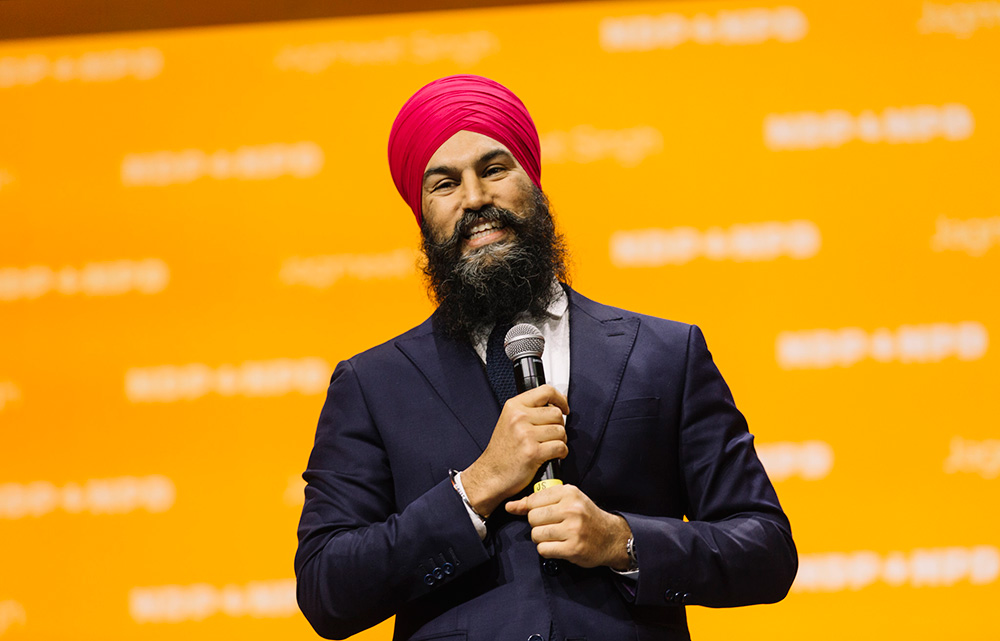“Social democracy has no divine right to exist; on the contrary, centre-left parties must be tireless in their efforts to convince electorates that they remain relevant to their day-to-day concerns...” — Rob Manwaring and Paul Kennedy, Why the Left Loses, Policy Press 2017
Social democracy’s star has clearly fallen in election after election around the world, but can once popular progressive parties regain their lost shine?
And will the international trend towards extremist, inexperienced and environmental parties — and away from social democratic ones — cause serious trouble for Canada’s own New Democratic Party in the Oct. 21 federal election?
The situation facing social democrats is certainly dire based on a series of very disappointing elections in Europe and elsewhere, but there are also signs that, with the right approach, left-of-centre success is again possible.
Spain’s recently beleaguered social democratic party, the PSOE, has emerged triumphant after leader Pedro Sánchez ran in the 2019 election as an “unapologetic progressive,” according to Omar G. Encarnación in the New York Review of Books.
The move “was pivotal in persuading Spaniards to vote Socialist again, especially young people, women, labor union members and disenchanted voters such as those who, in recent years, had abandoned the PSOE.”
As Sanchez said on election night: “To Europeans, I say that social democracy has a great future because it has a great present and Spain is an example of that.”
In neighbouring Portugal, the Socialist Party government of Antonio Costa came to power in 2015 and is leading the polls heading toward the October election.

Denmark’s Social Democratic party won the country’s June election — but not without adopting anti-immigration policies to fight off their hard-right opponents, the Danish People’s Party — a dramatically different strategy compared to Spain and Portugal.
Despite those successes, in at least Spain and Portugal, the recent political history for social democratic (or democratic socialist) parties is definitely daunting and could haunt leader Jagmeet Singh and the NDP in the fall election campaign, unless the Canadian party follows their path.
The ‘Pasokification’ of Social Democrats
Greece’s social democrats, the Panhellenic Socialist Movement, led the country for many years in the 1980s through the 2010s.
But in a dramatic decline the Greeks humorously termed the Pasokification, PASOK dropped from winning 44 per cent of the vote in the 2009 election to a humiliating 6.3 per cent in 2015.
Germany’s Social Democratic Party — which has had seven progressive chancellors in its history, including Willy Brandt, Helmut Schmidt and Gerhard Schroder — dropped to an all-time low of 20.5 per cent in the 2017 election.
And the Netherlands’ Labour Party — its social democrats — have faced similar recent electoral humiliation, dropping to just 5.7 per cent in the 2017 election and a seventh place finish nationally, from 24.8 per cent and second place in 2012. They last led the country in 1998.
Overall, the electoral “box score” for Team Social Democrats is lopsided and terrible.
Sweden: 28 per cent of the 2018 vote, the party’s worst result since 1911.
Austria: 27 per cent in 2018, and only one seat ahead of the far-right Freedom Party of Austria, founded in the 1950s by a former German SS officer.
France: Only 6.4 per cent of the vote in the first-round presidential election in 2017.
Italy: Just 18.7 per cent in 2018 elections.
United Kingdom: 40 per cent in 2017’s election but currently polling behind new Conservative Prime Minister Boris Johnson.
The rest of Europe shows similar failures for social democrats.
And of course, Canada’s own New Democratic Party fell from second place and official Opposition status under the late Jack Layton in 2011 and slumped to third place under leader Tom Mulcair in 2015 as the Liberals leapfrogged over both the NDP and Stephen Harper’s Conservatives.
That NDP botched election effort particularly rankled social democrats, as Mulcair promised to balance the budget while Justin Trudeau “campaigned from the left,” pledging he would run deficits to make up for years of Conservative social spending restrictions. It was a winning strategy, but not from social democrats.
‘Learning from mistakes,’ or not?
The German SPD undertook serious self-criticism after its 2017 defeat, publishing a 105-page report appropriately titled Learning From Mistakes that makes clear there were a lot of them, and the election campaign was the last, not the first.
“The 2017 election wasn’t lost in 2017, but rather in 2015,” the SPD report says. “No advertising in the world can rescue in these final six weeks a campaign that has been stumbling toward the end. The 2017 campaign had no strategic basis. It had no compass. Decisions were made on the spur of the moment.”
Ouch.
But the SPD’s problems are many and won’t be solved with a leadership change or other quick fix. And those problems are clearly shared widely with other social democratic parties.
First, entering coalitions with centre-right parties to form government invariably dilutes the progressive credentials of social democrats. Germany is a case in point.
But in many cases, like Sweden, the alternative is horrendous: effectively forcing centrists to work with far-right extremists to form governments.
And in countries like Austria, the Austrian People’s Party — already very conservative — had no problem forming a coalition with the far-right Freedom Party of Austria, despite its neo-Nazi roots and continuing controversies over anti-Semitic, anti-immigrant and anti-refugee actions and statements by key members.
Second, proportional representation electoral systems common to most European countries mean perpetual minority governments, where small parties are guaranteed seats in parliaments with as little as one per cent of the vote (in the Netherlands) and almost everywhere with five per cent.
That leaves both far-right and far-left parties as perpetual potential kingmakers after each election.
Parties with the largest percentage of votes and seats are usually called on to try to form a coalition government, and when social democrats led the polls, they usually led the country, with support from smaller parties like the Greens and regional or more left-leaning parties.
But when social democrats finish a distant second or even third or fourth, they’re often shut out of a coalition or marginalized within one.
Third, the Green Party of Canada has surfed concerns about climate change to a new level of popularity, but it’s not a social democratic party in any way. The current Green party slogan is “Not Left. Not Right. Forward Together.”
The Greens have attempted to redefine the politics of class to their own advantage with this sub-headline to the above: “The real divide of the 21st century is not left versus right, but insiders [the one per cent] versus the rest of us.”
It’s an empty Hallmark card philosophy bereft of any real analysis.
Green efforts to expand their platform beyond the obvious environmental concerns have been minimal. For example, Indigenous writer Robert Jago ripped the Green party’s Indigenous policy, calling it full of “errors, typos, contradictions and ill-considered proposals.”
“If we are to take the Green party seriously, then we should be deeply offended by their failure to come up with a credible Indigenous policy, or to subject their current policy to so much as a basic copy edit,” Jago wrote. (Elizabeth May and the Green party disagreed.)
Other policies are often flawed or haphazard. Veteran NDP MP Charlie Angus took May to task after she suggested that if SNC-Lavalin were found guilty on corruption charges, it could be punished by being made responsible for providing potable water to First Nations reserves.
Angus slammed May: “This is not a time to experiment with privatizing water services,” he wrote. “It is especially not the time for the Green party to use this crisis as a chance to promote an international corporation facing corporate corruption and bribery charges. What kind of message does that send to Indigenous communities about the value of reconciliation?”
Social democrats in every election need to point out the Greens’ inconsistencies, especially in Canada.
Fourth, immigration and the influx of refugees from non-European countries has become a major political issue with no easy solution.
But that hasn’t stopped far-right parties from proposing populist but cruel conditions that can appeal across traditional left-right party lines to working people fearing job loss and stress on social programs.
The challenge for social democrats and moderate-centre parties alike is to counter the far-right demagogy with practical, acceptable solutions, says Gerald Knaus, chairman of the Berlin-based European Stability Initiative think tank.
“What is lacking from mainstream parties is a coherent, convincing message that they can control arrivals without violating human rights,” Knaus told Reuters in May. “The majority of people want migration control, but they also have empathy for refugees. As things stand, these voters have no one to turn to.”
However, to ascribe the far-right’s electoral success solely to immigration issues would be a fundamental mistake.
As immigration and refugee numbers dramatically decline in Europe, the economy and unemployment, terrorism, housing, pensions, climate change, corruption and other issues are rising in importance, though immigration is still a significant issue, according to a major poll of 14 European countries released in April.
And those issues play to social democrats’ strong suit — the parties’ ability to address the real-life concerns of ordinary voters without letting rabid anti-immigrant rhetoric from far-right parties dominate election campaigns.
Are there lessons for Canada’s NDP in Europe’s recent experience? Of course. While this country has not suffered the rampant racism directed to immigrants seen in countries like Germany and Austria, it does, disturbingly, exist.

No leader is better able to articulate the immigrant experience and the great benefits Canada has enjoyed from welcoming all cultures to this country than NDP Leader Jagmeet Singh.
As the first person of colour to lead a major national political party, Singh can warn of the damage of extremism and point out the advantages of immigration.
There is clearly risk in Singh opposing Quebec’s new restrictions on public sector workers displaying religious symbols, given the law’s apparent popularity.
But the NDP and its predecessor, the Co-operative Commonwealth Federation, have a proud history of fighting unfair and racist laws, including the internment of Japanese Canadians during the Second World War and the War Measures Act introduced by then Liberal prime minister Pierre Trudeau in 1970 — and history has proven the party right.
A recent poll said 36 per cent of Quebecers oppose the religious symbols law: they could be open to a principled opposition to an unfortunate decision supported by provincial parties. Given that recent polling put the NDP at just 9.4 per cent, it would make sense to appeal to Quebecers who reject the law.
Singh also can and has pointed out a clear truth that past leaders like Tommy Douglas, David Lewis and Layton used to great effect — that the Liberals and Conservatives govern on behalf of the wealthy, privileged and corporations, not ordinary Canadians.
And Singh’s approach is getting the best kind of praise — being denounced in the business press! In a diatribe against the NDP election campaign platform, Financial Post writer Matthew Lau rails against Singh in an article with an unwittingly hilarious headline: “The NDP’s new tax-the-rich plan is terrible even by their standards.”
“The class warfare section of the federal NDP’s plan, released four months before the federal election, is entitled A New Deal for Tax Fairness. It’s found on page 44 of the platform, in a sea of economic absurdities and expensive promises.
“This is unsurprising. It’s the NDP; economic absurdities are their stock-in-trade. Under Jagmeet Singh’s leadership, their inventory is overflowing,” Lau huffs.
While right-wing commentators may be aghast, if Singh channels the successful campaign of Spain’s Pedro Sanchez to reach ordinary voters, the NDP just might surprise a lot of critics in October. ![]()
Read more: Election 2019

















Tyee Commenting Guidelines
Comments that violate guidelines risk being deleted, and violations may result in a temporary or permanent user ban. Maintain the spirit of good conversation to stay in the discussion.
*Please note The Tyee is not a forum for spreading misinformation about COVID-19, denying its existence or minimizing its risk to public health.
Do:
Do not: